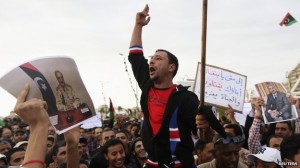
My two Diigo entries this week were regarding Libya’s divided political and armed groups and their competition for power, and the coalition of Arab states in the combat against ISIS. The two articles share a common theme of radical policy in the Arab world, and their lack of Political and Market Liberalism. I chose these two entries due to our focus on Libya’s history, our discussions on current ISIS events, and the various perspectives on globalization. My first article from Al Jazeera illuminated the rivalry in Libya descending from Gaddafi’s reign. After discussing the historical timeline of Gaddafi’s regime in class, it prompted me to look into how Libya is functioning currently to create a stable government. Despite the fact that Gaddafi is gone, there are still traces of his regime in tact. The General National Congress is split into two separate governments, ruling in two separate major cities, and militant rivalries in support of these distinct governments are in direct conflict with each other. External support from Arab states has transformed the conflict into a regional struggle. On the surface Libya is in support of Political and Market Liberalism, aiming to rejoin the international community in terms of multinational oil corporations. However, deeply entrenched religious and political factions have made Liberalism almost unattainable and Radicalism is still in tact from Gaddafi’s ousted regime. Exploitation of the common population still exists due to the wealthy few, and the debate over which government should take power is more so a debate on which government will allocate the state revenues to the masses more effectively. My second article was about ISIS and the Arab state coalition that is organizing to combat it. Arab states are showing a sort of Radical policy towards this coalition, asking Western powers to limit their participation to air strikes only and leave the ground fighting to the regional powers. While the Arab world strives to become more Liberal minded, they tend to remain in the radical realm, promoting national self-reliance and isolationist policies.